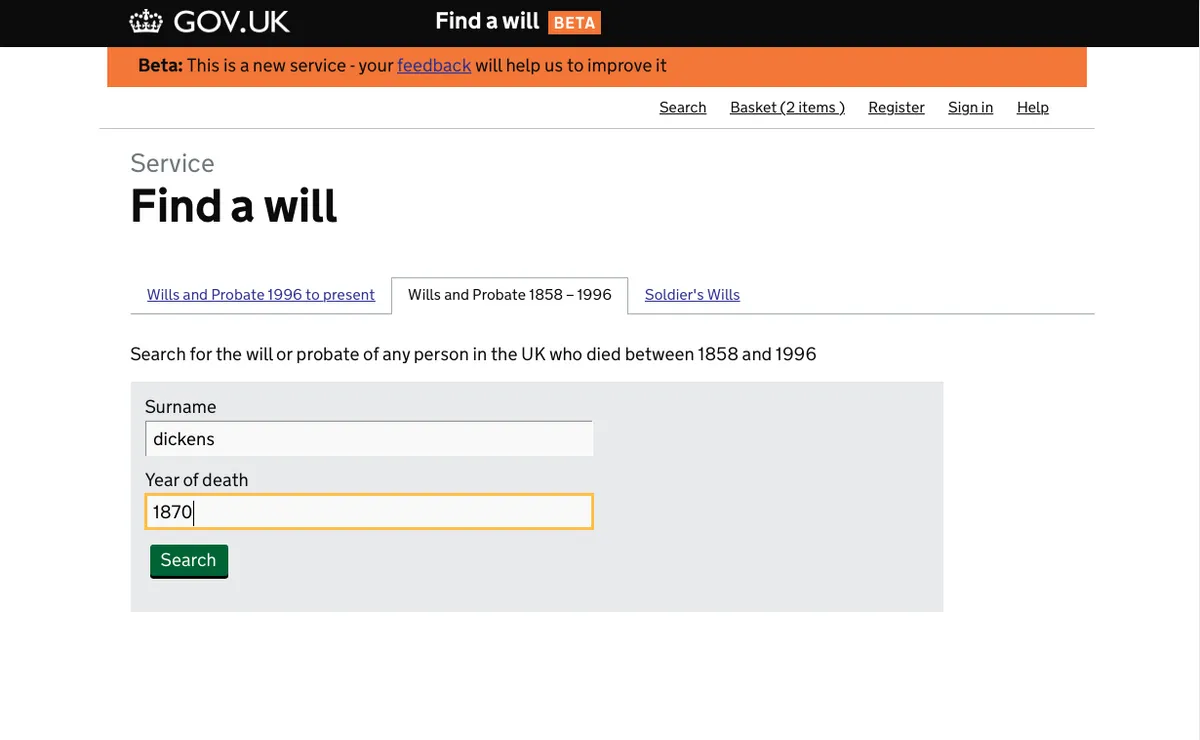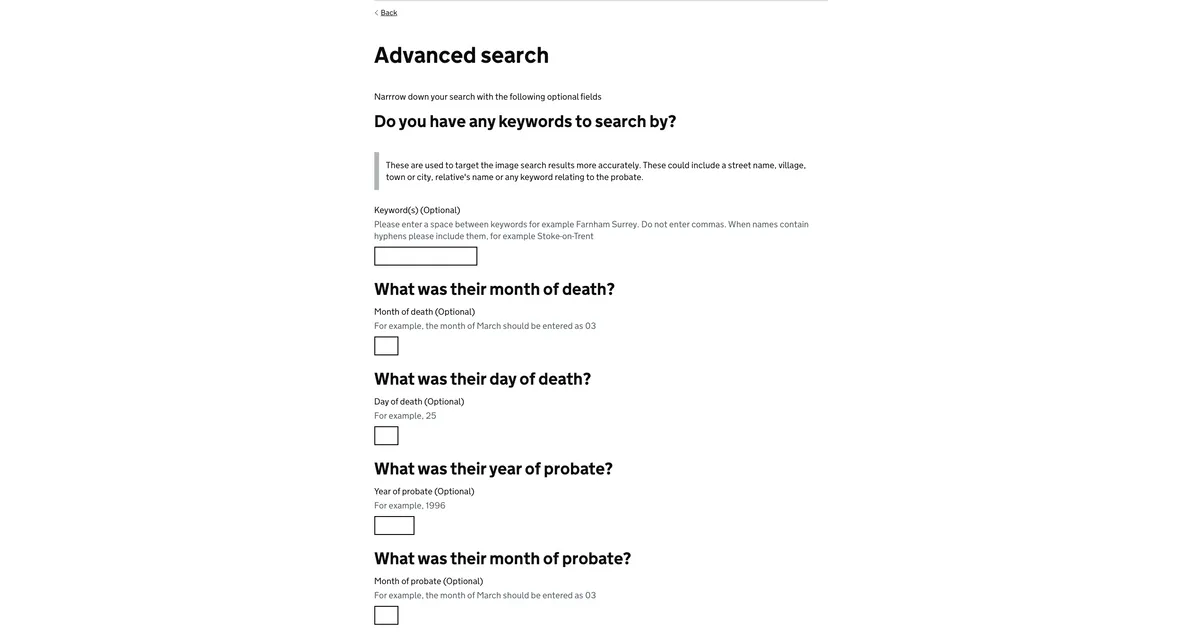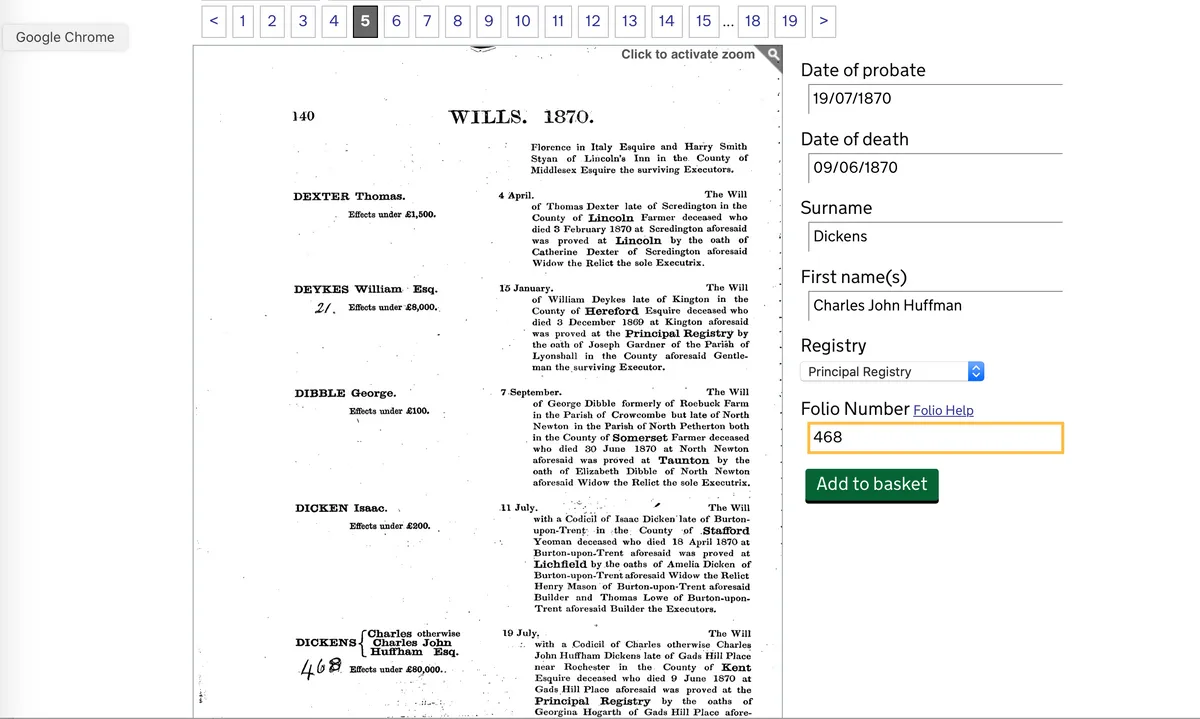Probate is the process of dealing with the property, money and possessions of a person who has died, usually laid out in their will. Probate records are a useful resource for family history because you can use them to confirm when your ancestor died and trace other members of their family who are named as heirs in their will. They can even provide you with a picture of your ancestor's life by showing how much property and money they owned, or reveal long-hidden family dramas such as relatives who were cut out of the will. You can also order the probate records of more recently deceased people and celebrities.
Until the middle of the 19th century, the process of handling probate through proving wills or granting administrations came from church courts such as the Prerogative Court of Canterbury. But from 12 January 1858 a civil Court of Probate for England and Wales was established, with the Principal Registry in London and numerous other district registries. The district registries sent copies of all Grants of Probate, and all wills associated with them, and all Grants of Letters of Administration to the Principal Registry where annual centralised indexes were prepared. These are known as the Probate Calendars, and are now all available to search online.
The Probate Calendars include those who left a will and those died intestate (with no will) but with an estate that had to be administered. Records that say 'Probate', 'Grant and Will', ‘Administration (Admon) with Will’ or just 'Will' refer to records where a will existed and was provided. Records that just say 'Administration' or ‘Administration or Grant’ refer to people who died intestate and for whom there is no will.
The arrangement and content of the Calendars has changed over time. Within the annual volumes, with names arranged alphabetically, wills and administrations are listed separately from 1858 to 1870. A single sequence starts in 1871. Note that the Calendars are arranged by date of probate, not date of death. Although probate was usually completed soon after the death there could be considerable delay, sometimes decades or longer.
The Probate Calendars can contain a great deal of useful information, although this also changes over time. For probate records from 1858 to 1891 you could get: the name of the deceased; their address and occupation (or “wife of”, “widow of” or “spinster” in the case of a woman); date and place of death; names, occupations and addresses of executors, together with any relationship to the deceased; and date of probate and name of the Registry. From 1892 to 1957, the probate records don't contain the address or relationship of the executors; and from 1959 to 1967 no details of husbands are included. From 1968 the information decreases still further and only the name, address and date of death of the testator are given, together with the date and place of the grant.
Included in the Calendars are Irish probates and administrations and Scottish confirmations resealed in England, 1858 to 1930 – until 1876 these are listed after the letter ‘Z’; also, reseals of colonial grants from 1894 to 1930. Wills and administrations from the Prerogative Court of Canterbury wills, which was previously responsible for probate in southern England and most of Wales, from 1 to 9 January 1858 are included in the 1858 Calendars. Unfortunately, the wills of soldiers (not commissioned officers) who were killed in action in conflicts from the Crimean War onwards are not included in the main series of Calendars.
You can currently order probate records from the government’s Find a Will website for just £1.50 each.
To search for probate records, go to the website. There are three options to choose from: Wills and Probate 1858–1995; Wills and Probate 1996 to present (new probate records appear online approximately 14 days after the grant of representation has been issued); and Soldier’s Wills (1850–1986). You should then enter the surname of the deceased and their year of death. In this case, I’m looking for the will of novelist Charles Dickens, who died in 1870.

You will then have an 'Advanced Search' page with the option to enter more information to further narrow down the search results.

You will then be shown a page of search results, which will enable you to click through to the probate calendar with the deceased individual's record on it. Note that some wills are difficult to search for following an upgrade to the website. To make it easier, you may have to use wildcards or change your use of quotation marks, spaces or other symbols in the search box. You may have to click through multiple pages of results.

Once you’ve found it, enter the details from the probate record into the boxes on the right of the page. You should select the date of probate and date of death from the calendars on the right, then enter the first name (s) of deceased, then select the registry from the drop-down menu, then enter the folio number, if one is included. The folio number is only shown for wills proved at the Principal Registry in London before 1930 and they are usually handwritten next to the entry. If there is no folio number written next to an entry, then you can leave that box blank. As Charles Dickens’ will was proved at the Principal Registry it does include a folio number. You should then click ‘Add to basket’ to purchase a copy of the will.

Findmypast also has searchable copies of the probate calendars, and Ancestry has them up to 1995.
The search options for searching the wills include: first and middle name(s); surname; death date and location; Probate Registry date and location; and keyword (which identifies only the names of the deceased, and the death and probate locations).
If you are trying to trace Irish ancestry, please see our separate guide to Irish wills.